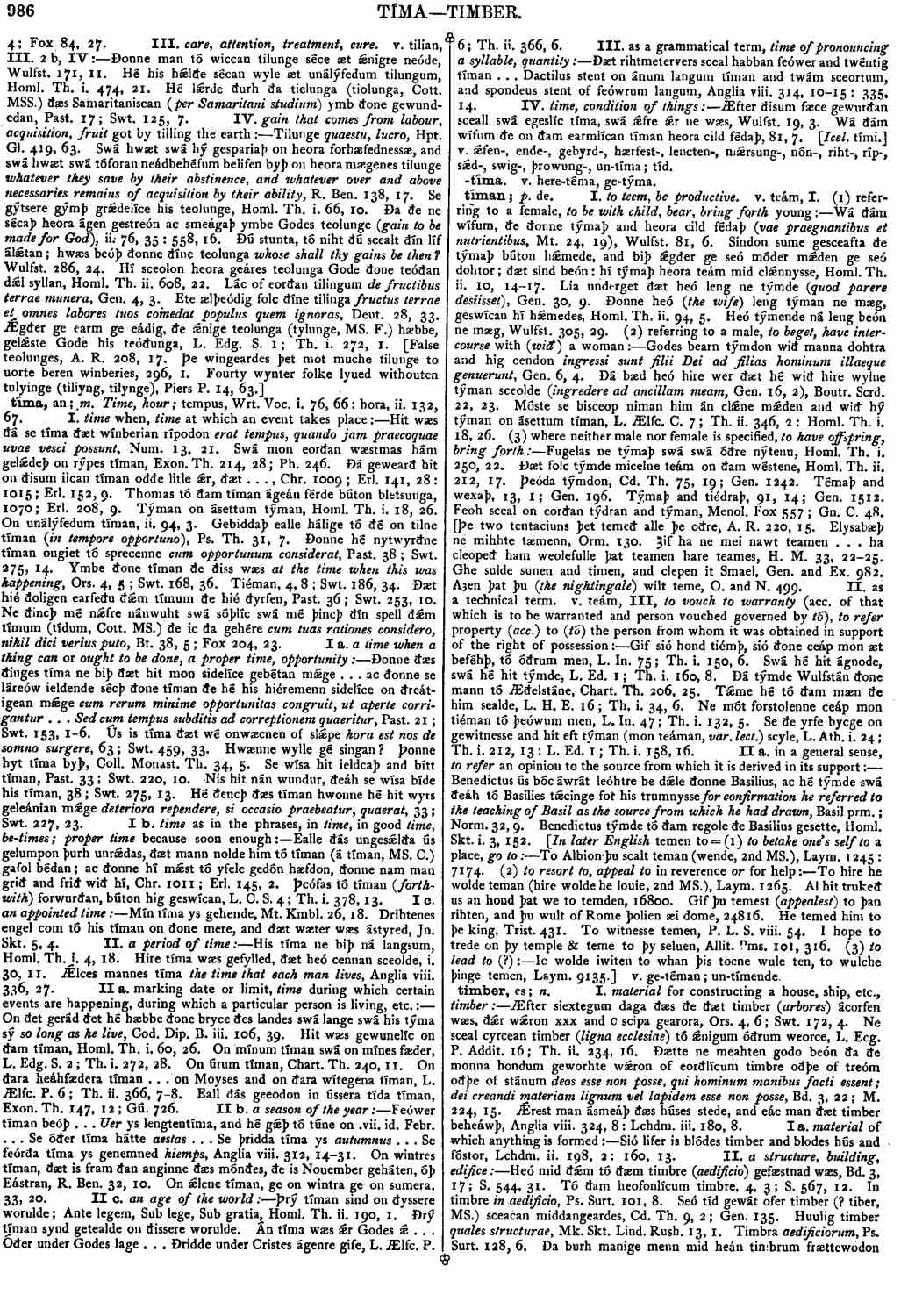tíma
- noun [ masculine ]
- Wrt. Voc. i. 76, 66: hora, ii. 132,
67.
-
Hit wæs ðá se tíma ðæt wínberian rípodon
erat tempus, quando jam praecoquae uvae vesci possunt,
- Num. 13, 21.
-
Swá mon eorðan wæstmas hám gelǽdeþ on rýpes tíman,
- Exon. Th. 214, 28; Ph. 246.
-
Ðá gewearð hit on ðisum ilcan tíman oððe litle ǽr, ðæt . . .,
- Chr. 1009; Erl. 141, 28: 1015; Erl. 152, 9.
-
Thomas tó ðam tíman ágeán férde búton bletsunga,
- 1070; Erl. 208, 9.
-
Týman on ásettum týman,
- Homl. Th. i. 18, 26.
- On unálýfedum tíman, ii. 94, 3.
-
Gebiddaþ ealle hálige tó ðé on tilne tíman (
in tempore opportuno
),- Ps. Th. 31,
7.
-
Ðonne hé nytwyrðne tíman ongiet tó sprecenne
cum opportunum considerat,
- Past. 38; Swt. 275, 14.
-
Ymbe ðone tíman ðe ðiss wæs
at the time when this was happening,
- Ors. 4, 5; Swt. 168, 36.
-
Tiéman,
- 4, 8; Swt. 186, 34.
-
Ðæt hié ðoligen earfeðu ðǽm tímum ðe hié ðyrfen,
- Past. 36; Swt. 253, 10.
-
Ne ðincþ mé nǽfre nánwuht swá sóþlíc swá mé þincþ ðín spell ðǽm tímum (tídum, Cott. MS.) ðe ic ða gehére cum tuas rationes considero, nihil dici verius puto, Bt. 38, 5; Fox 204, 23. I a. a time when a thing can or ought to be done, a proper time, opportunity :-- Ðonne ðæs ðinges tíma ne biþ ðæt hit mon sidelíce gebétan mǽge . . . ac ðonne se láreów ieldende sécþ ðone tíman ðe hé his hiéremenn sidelíce on ðreátigean mǽge
cum rerum minime opportunitas congruit, ut aperte corrigantur . . . Sed cum tempus subditis ad correptionem quaeritur,
- Past. 21; Swt. 153, 1-6.
-
Ús is tíma ðæt wé onwæcnen of slǽpe
hora est nos de somno surgere,
- 63; Swt. 459, 33.
-
Hwænne wylle gé singan? Þonne hyt tíma byþ,
- Coll. Monast. Th. 34, 5.
-
Se wísa hit ieldcaþ and bítt tíman,
- Past. 33; Swt. 220, 10.
-
Nis hit nán wundur, ðeáh se wísa bíde his tíman,
- 38; Swt. 275, 13.
-
Hé ðencþ ðæs tíman hwonne hé hit wyrs geleánian mǽge deteriora rependere, si occasio praebeatur, quaerat, 33; Swt. 227, 23. I b. time as in the phrases, in time, in good
time, be-times; proper time
because soon enough :-- Ealle ðás ungesǽlða ús gelumpon þurh unrǽdas, ðæt mann nolde him tó tíman (á tíman,- MS. C.)
-
Þcófas tó tíman (forthwith) forwurðan, búton hig geswícan, L. C. S. 4; Th. i. 378, 13. I c.
an appointed time
:-- Mín tíma ys gehende,- Mt. Kmbl. 26, 18.
-
Drihtenes engel com tó his tíman on ðone mere, and ðæt wæter wæs ástyred,
- Jn. Skt. 5, 4.
-
His tíma ne biþ ná langsum,
- Homl. Th. i. 4, 18.
- Hire tíma wæs gefylled, ðæt heó cennan sceolde, i. 30, 11.
-
Ǽlces mannes tíma the time that each man lives, Anglia viii. 336, 27. II a. marking date or limit, time during which certain events are happening, during which a particular person is living, etc. :-- On ðet gerád ðet hé hæbbe ðone bryce ðes landes swá lange swá his týma sý
so long as he live,
- Cod. Dip. B. iii. 106, 39.
-
Hit wæs gewunelíc on ðam tíman,
- Homl. Th. i. 60, 26.
-
On mínum tíman swá on mínes fæder,
- L. Edg. S. 2; Th. i. 272, 28.
-
On úrum tíman,
- Chart. Th. 240, 11.
-
On ðara heáhfædera tíman . . . on Moyses and on ðara wítegena tíman,
- L. Ælfc. P. 6; Th. ii. 366, 7-8.
-
Eall ðás geeodon in ússera tída tíman, Exon. Th. 147, 12; Gú. 726. II b. a season of the year :-- Feówer tíman beóþ . . . Uer ys lengtentíma, and hé gǽþ tó túne on .vii. id. Febr. . . . Se óðer tíma hátte aestas . . . Se þridda tíma ys autumnus . . . Se feórða tíma ys genemned
hiemps,
Anglia viii.- 312,
14-31.
-
On wintres tíman, ðæt is fram ðan anginne ðæs mónðes, ðe is Nouember geháten, óþ Eástran,
- R. Ben. 32, 10.
-
On ǽlcne tíman, ge on wintra ge on sumera, 33, 20. II c.
an age of the world
:-- Þrý tíman sind on ðyssere worulde; Ante legem, Sub lege, Sub gratia,- Homl. Th. ii. 190,
1.
-
Ðrý tíman synd getealde on ðissere worulde. Án tíma wæs ǽr Godes ǽ . . . Óðer under Godes lage . . . Ðridde under Cristes ágenre gife,
- L. Ælfc. P. 6; Th. ii. 366, 6.
- Ðæt rihtmetervers sceal habban feówer and twéntig tíman . . . Dactilus stent on ánum langum tíman and twám sceortum, and spondeus stent of feówrum langum, Anglia viii. 314, 10-15: 335, 14.
-
Æfter ðisum fæce gewurðan sceall swá egeslíc tíma, swá ǽfre ǽr ne wæs,
- Wulfst. 19, 3.
-
Wá ðám wífum ðe on ðam earmlícan tíman heora cild fédaþ,
- 81, 7.
Bosworth, Joseph. “tíma.” In An Anglo-Saxon Dictionary Online, edited by Thomas Northcote Toller, Christ Sean, and Ondřej Tichy. Prague: Faculty of Arts, Charles University, 2014. https://bosworthtoller.com/30503.
Checked: 0